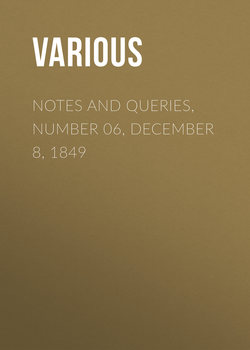Читать книгу Notes and Queries, Number 06, December 8, 1849 - Various - Страница 4
ON A PASSAGE IN GOLDSMITH
ОглавлениеSir,—I observe in the Athenæum of the 17th inst. a quotation from the Life of Goldsmith by Irving, in which the biographer seems to take credit for appropriating to Goldsmith the merit of originating the remark or maxim vulgarly ascribed to Talleyrand, that "the true end of speech is not so much to express our wants as to conceal them."
This is certainly found in No. 3. of The Bee, by Goldsmith, and no doubt Talleyrand acted upon the principle of dissimulation there enunciated; but the idea is much older than either of those individuals, as we learn from a note in p. 113. of vol. lxvii. Quart. Rev. quoting two lines written by Young (nearly one hundred years before), in allusion to courts:—
"Where Nature's end of language is declined,
And men talk only to conceal their mind."
Voltaire has used the same expression so long ago as 1763, in his little satiric dialogue La Chapon et la Poularde, where the former, complaining of the treachery of men says, "Ils n'emploient les paroles que pour déguiser leurs pénsees." (see xxix. tom. Oeuvres Complétes, pp. 83, 84. ed. Paris, 1822.)
The germ of the idea is also to be found in Lloyd's State Worthies, where speaking of Roger Ascham, he is characterised as "an honest man,—none being more able for, yet none more averse to, that circumlocution and contrivance wherewith some men shadow their main drift and purpose. Speech was made to open man to man, and not to hide him; to promote commerce, and not betray it."
Lloyd's book first appeared in 1665, but I use the ed. by Whitworth, vol. i. p. 503.
F.R.A.
Oak House, Nov. 21. 1849.
[The further communications proposed to us by F.R.A. will be very acceptable.]
